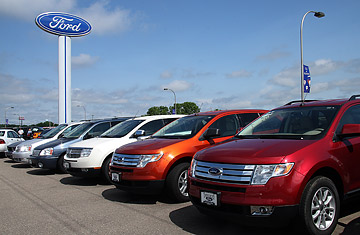
Detroit's struggling and battered automakers are mounting an ambitious push this week for up to $50 million worth of federal loans, which are much less expensive than private credit. They are eager to have necessary legislation in place by the time Congress adjourns before the election. As recently as last winter, loan guarantees for carmakers had seemed like a piece of the Motor City's past (President Carter signed off on the Chrysler loan guarantees in 1980). But a combination of the economic slowdown and Presidential campaign politics, as well as the precedent of the federal bailout of Wall Street's banks, have helped jump-start Detroit's campaign for loan guarantees. "We think we have some real momentum," says one General Motor official, who has been close to the quiet campaign for federal aid. "Times have changed."
The interest rates offered for industrial companies with shabby credit ratings have soared over the summer, making the federal option even more crucial. All three of Detroit's carmakers have had their credit ratings downgraded; GM has had to fight off rumors of an impending bankruptcy; and Cerberus, Chrysler's principal owner, has been hammered by a new round of cutbacks. Ellen Hughes Cromwick, Ford's chief economist, said this week that the unfolding credit crunch has a had a palpable impact on the carmakers. "The credit crunch could persist for some time," she said. "That's a situation that adds a lot of uncertainty to the market."
However, the tight Presidential race is playing out to the advantage of domestic carmakers as they press for legislation for the loan guarantees. The list of states that would benefit includes the potential swing states of Michigan, Ohio, Indiana and Missouri. "That's where the election is going to be decided, right there," notes one Ford official, who asked not to be identified. Barack Obama, the Democratic Presidential candidate, and Republican nominee John McCain have endorsed the loan guarantees. Both candidates also voted for the Energy Bill approved by Congress and signed by President George W. Bush in December that included language paving the way for the loan guarantees. "We are encouraging Congress to take this up now," says John Bozzella, vice president of external affairs and public policy for Chrysler. Auto company spokespeople insist that they're not asking for a bailout. "These are direct loans that we have to pay back," explains Ford spokesman Mike Moran. "Direct loans to automakers and suppliers will support American workers and strengthen the future of U.S. manufacturing and the economy. Borrowing capital at a lower cost than the double-digit interest rates we are now paying will allow us to accelerate investment in fuel efficient technologies and help us transform quicker."
"This was authorized by Congress. There was a consensus this was needed to transform and drive new technology," Bozzella says. Apart from America's Big Three, one third of U.S. automotive suppliers are now in danger of bankruptcy because of production cuts by Detroit according to a recent study.
Even foreign carmakers operating in the U.S. could qualify for the loans, noted Bozzella. "There are no restrictions in the language on which companies are in and which companies are out," he says. However, none of the foreign automakers with manufacturing plants (such as Nissan) in the U.S. have expressed a direct interest.
The automakers say they have a commitment from the Democratic Party's Congressional leadership to take up the enabling legislation when both the House and Senate reconvenes on Sept. 9. "I wouid be loathe to put a timetable to this," says GM's Martin. "But we would like to see it in place by the end of the session. We are attaching a large sense of urgency to it." The Democratic leadership is considering attaching the loan guarantees to either a new economic stimulus package that Congress is expected to take up this month or even to the appropriation bill need to keep the federal government running after Oct. 1.
